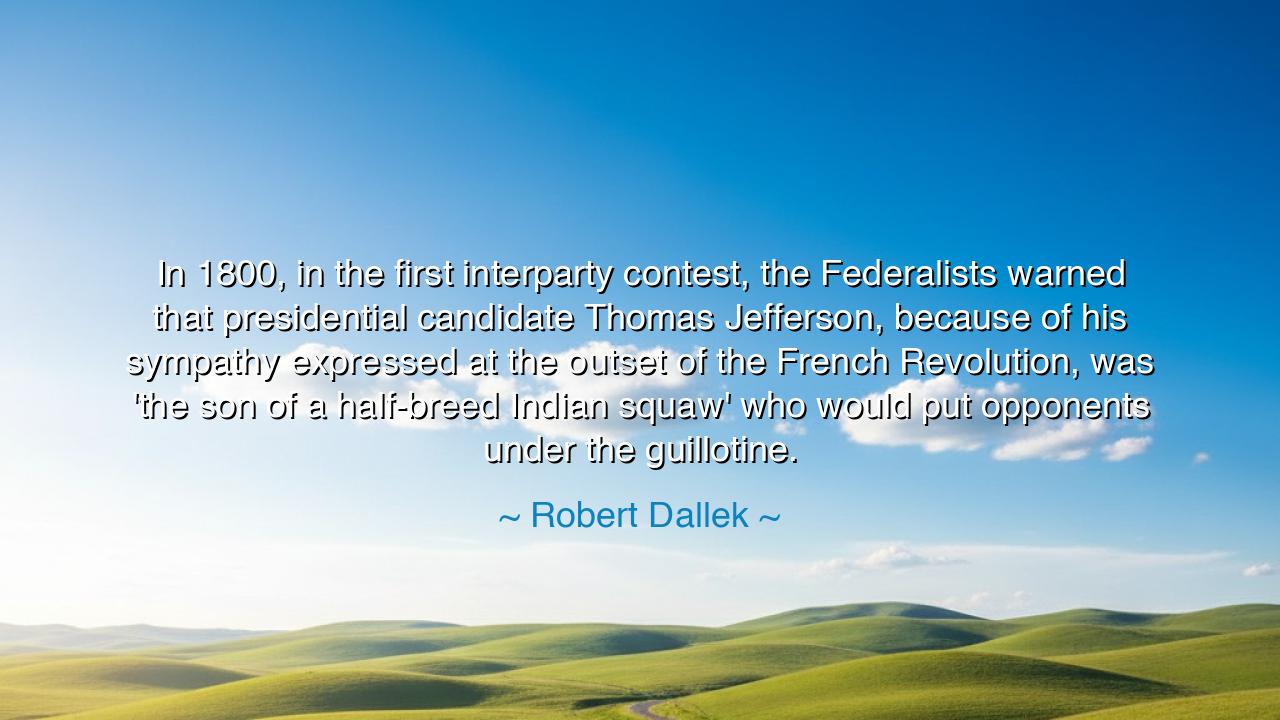
In 1800, in the first interparty contest, the Federalists warned
In 1800, in the first interparty contest, the Federalists warned that presidential candidate Thomas Jefferson, because of his sympathy expressed at the outset of the French Revolution, was 'the son of a half-breed Indian squaw' who would put opponents under the guillotine.






When Robert Dallek recalled the venom of the year 1800—“In 1800, in the first interparty contest, the Federalists warned that presidential candidate Thomas Jefferson, because of his sympathy expressed at the outset of the French Revolution, was ‘the son of a half-breed Indian squaw’ who would put opponents under the guillotine”—he exposed a truth that echoes across centuries: that the struggle for power often gives birth to slander darker than reason, to accusations more savage than truth. His words remind us that politics, though it can be noble, is also a battlefield where fear and insult are wielded like weapons, and where even the founders of a nation were not spared from venomous attack.
The origin of this moment lies in the great contest between the Federalists and the Democratic-Republicans. The Federalists, defenders of order and centralized strength, looked with horror at Jefferson’s sympathy for the French Revolution, which, in their minds, was stained with blood and chaos. They believed—or wished others to believe—that Jefferson’s ideals would lead America itself into a reign of terror. Unable to destroy him through reasoned debate alone, they turned to mockery and fear, painting him as unfit, un-American, even monstrous. Thus, they hurled vile accusations, branding him with false lineage and threatening images of guillotines rising in American streets.
History shows us that this was not the last time such rhetoric would poison public life. Consider the presidency of Abraham Lincoln, who was mocked as a “gorilla” and derided as a backwoods fool unworthy of office. Consider too the words hurled at Franklin D. Roosevelt, accused of being a tyrant who would destroy the republic with his New Deal reforms. Again and again, the pattern repeats: when fear grips the powerful, slander becomes their refuge.
The meaning of Dallek’s reminder is clear: the ugliness of political discourse is not a modern disease but a wound as old as democracy itself. When he cites this insult against Jefferson, he is showing us that even the men we now revere as statesmen once faced the fire of cruelty and lies. It is easy to imagine the past as noble and dignified, but the truth is harsher. The founders’ world, like ours, was one where opponents were not merely debated but demonized. The guillotine invoked against Jefferson was not an argument, but a specter, raised to terrify and divide.
The lesson we must take is sobering: do not be surprised when the path of leadership is lined with slander, nor think that insults prove unworthiness. If Jefferson, the author of the Declaration of Independence, could be maligned so bitterly, then all who step into the arena must expect the same. Yet there is also hope—for Jefferson endured, and his vision for the republic endured with him. History did not preserve the insults, but the ideals. The lies of the moment faded, while the truth of his legacy remained.
What, then, should you do? First, when you hear slander in politics, pause and weigh it against history, remembering that lies are the weapons of fear, not of wisdom. Second, if you aspire to leadership, steel yourself against insult, for it is the price demanded of those who step forward. Third, as a citizen, refuse to be ruled by fear, whether of guillotines, conspiracies, or caricatures—seek the truth, and judge by reason, not by terror.
Thus, let Dallek’s words echo as a warning and as counsel: “In 1800 … the Federalists warned that Jefferson … would put opponents under the guillotine.” This was false then, as many such charges are false now. But the teaching endures: that slander cannot kill truth, and that though the weapons of fear are sharp, the blade of history is sharper still. It is not the insult that endures, but the vision; not the mockery that shapes the world, but the ideals lived out with courage.






AAdministratorAdministrator
Welcome, honored guests. Please leave a comment, we will respond soon